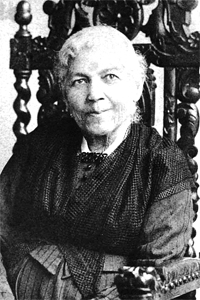Harriet Jacobs is most well known as the author of Incidents
in the Life of a Slave Girl. This autobiography details her life as she
realized that she was a slave at the age of six, was given to a three year old
at age eleven, and attempted to avoid the sexual advances of her owner’s
father. To escape these advances, she started a relationship with a white
lawyer by whom she had two children. Jacobs then ran away from her owner,
hiding in her grandmother’s attic for seven years before using a boat to escape
to the North (Jacobs,
1861).
 |
| Source |
Upon her freedom, Jacobs wrote her autobiography, broaching
the topic of female slaves’ sexual abuse. Her story had a difficult time
getting published, but once it did, it was soon overclouded by the Civil War
and was never reprinted during her lifetime. It was rediscovered and reprinted
during the Civil and Women’s Rights movements of the 1960s and 1970s. In
addition to being an author, she worked in Rochester, NY for
the Anti-Slavery Office and Reading Room and participated in other relief efforts
for blacks before dying in 1897.
Jacobs was a true servant leader. Northouse
(2016) listed several characteristics of servant leaders: putting the good
of followers before their own self-interests, emphasizing follower development,
strong moral behavior, and a possessing a social responsibility to be concerned
about the “have-nots”. Jacobs rose to meet these descriptors. Despite having to keep own self-interests in
mind (she was a fugitive for many years), she put her fears aside to help
others of her race, even returning
south to Georgia to help in relief efforts. The link above also lists how
she empowered others as she founded a school with her daughter that lasted from
1863 to 1865. Perhaps most importantly, Jacobs possessed a strong moral code
and though she began an illicit relationship, she did so in an effort to save
herself from the sexual advances of her master, for which she apologizes in her
book.
.png?format=500w) |
| Source |
When trying to decipher today’s relevance of Jacobs’ life
over 100 years ago, it is easy to connect to modern movements, especially the
role of black women in the #BlackLivesMatter
movement. Though much focus has been on males who die at the hands of police,
the leaders of the African American Policy Forum have created a new hashtag: #SayHerName,
shifting focus to the black cis and trans women who have died because of police
behavior. The number of minority women
who have encountered brutality at the hands of someone more powerful than they
(first slaveowners, now police) is a painful reminder that women are not to be
ignored in the fight for freedom. The connection between Jacobs and #SayHerName
is best articulated by this quote from Documenting
the American South from UNC: “At the same time, however,
Jacobs articulates a bolder truth—that the morality of free white women has
little ethical relevance or authority when applied to the situation of enslaved
black women in the South”. Jacobs’
work should be used to consider how black women finally deserve a place at the
table.
No comments:
Post a Comment